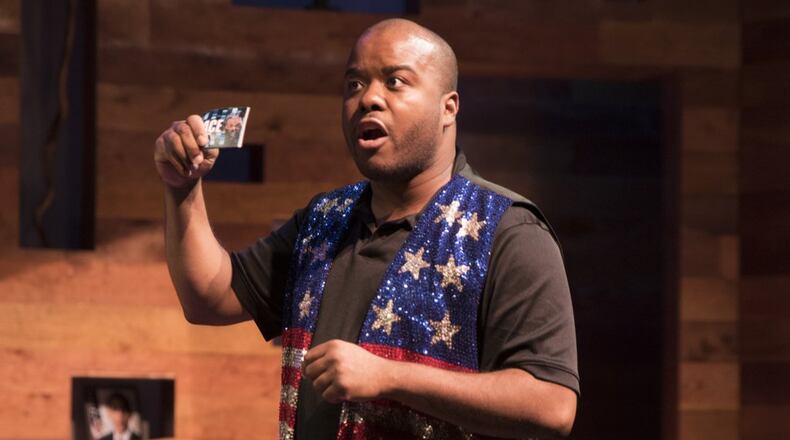Mark Kendall’s “The Magic Negro and Other Blackity Blackness as Told by an African-American Man Who Also Happens to be Black” is a smart, funny and troubling look at race in America today.
It is guaranteed to make you laugh, even though you may later feel ashamed of yourself for doing so.
He’s the old black figure, smiling and happy, imbued with timeless wisdom, who helps the white hero get through some extraordinary challenge.
Spike Lee popularized the term in 2001. A culture critic stuck the label on Barack Obama in 2007, saying he was there to assuage white guilt over slavery. Now Kendall uses it to frame the racism that lurks at the edges of polite society, no matter how doggedly we deny it.
RELATED: The ‘Magic Negro’ and comedian Mark Kendall’s quest to kill him
RELATED: Alliance Theatre will scatter 2017-2018 shows around metro area
A Dad’s Garage ensemble member who’s been honing this work since 2014, Kendall is a brilliant writer and performer.
And he sure doesn’t have to look far for his material.
The Braves and MARTA. The Oscar mix-up. Presidential politics. Professional football. These are some of the everyday headlines he co-opts to prove that black people are marginalized and demonized by white America.
“They never see you at all,” he says. “All they see is black.”
Time and time again, the good-natured Kendall pulls a white face from the audience and puts him (or her) through self-awareness exercises that are sharp-edged but never mean-spirited.
On the night I caught the piece, the man chosen to re-enact the timeline of African-American history, starting in a trapdoor doubling as a slave ship, came out alive — even though his Oscar was snatched back.
The “Sam or Larry Show,” ingeniously designed to see if a person can distinguish between Samuel L. Jackson and Laurence Fishburne, was funny and harmless enough.
Other moments were awkward, painful almost. Take the lady who couldn’t answer a question about Tupac and Notorious B.I.G. “I don’t know who they are,” she said, almost squirming. Hey, I’m not judging. I feel you.
And so does Kendall, who is nothing if not gracious and kind to audience participants.
In one of the best sequences, Dr. Seuss’ “Green Eggs and Ham” gets an inspired makeover. Those detested green eggs become a racial epithet.
“Would you say it in your house?” Sam-I-Am asks his friend.
“Would you say it to a mouse?”
Of course, he would. It was there inside him all along.
Toward the end of the show, thoughtfully directed by Anthony LeBlanc, Kendall stops his skit, something about Beyonce down on the plantation, before it begins.
He’s been making fun of himself, of black stereotypes and white ignorance, and the audience has been laughing like crazy. His characters have done their job. But the person inside is upset and confused. He feels beaten up.
That he has taken off the mask to confess his vulnerability is a brave, noble thing to do. (Or so it appears. It may in fact be a tad disingenuous. Remember, he's a professional actor. Still, we get the point: All we can see is black.) The emotional cost of portraying a Magic Negro is considerable.
When you leave the theater, you may be tempted to text all your friends: "Man, You've gotta see this! It's so damn good.' "
It is. And you should.
Just keep in mind that laughing is the easy part. Confronting the ugliness beneath the comedy is way harder.
THEATER REVIEW
“The Magic Negro and Other Blackity Blackness as Told by an African-American Man Who Also Happens to be Black”
Grade: A-
Through April 15. 7:30 p.m. Wednesdays-Thursdays; 8 p.m. Fridays-Saturdays; 10:30 p.m. Saturdays. $15-$25. Alliance Theatre, Hertz Stage, 1280 Peachtree St. N.E., Atlanta. 404-733-5000, alliancetheatre.org/magicnegro.
Bottom line: Terrific satire. Cuts right through the skin.
About the Author
Keep Reading
The Latest
Featured




